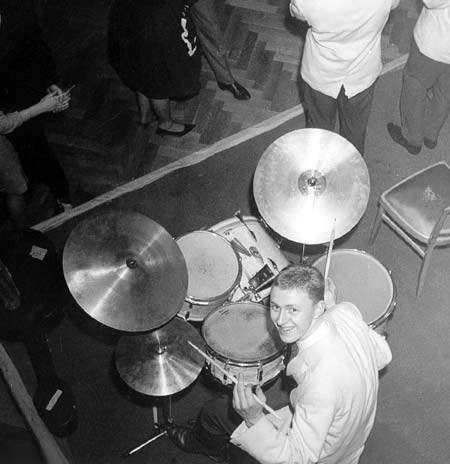You can tell the quality of a man based on the company he keeps. Klaus Weiss, drummer, can be able to claim preeminence in his field by this simple fact. Klaus Weiss has maintained some very distinguished musical company over the course of his career that spans four decades. Benny Bailey and Cecil Bridgewater were his musical friends. When American jazz musicians started touring Europe more frequently in the post-war period, and began playing with local rhythm sections and a lot of drummers, their greatest problem was finding drummers who were both flexible and patient. In 1958, there were very few European drummers. Klaus Weiss started his professional career. Weiss was a popular choice for visiting jazz musicians because, as Johnny Griffin noted, “he’s one of few European drummers who has that American feel.” Klaus Weiss was born in Gevelsberg (Westphalia) on February 17, 1942. He learned to play the drums at 16 and joined the Jazzopators. This group accompanied American trumpeter Nelson Williams as well as singer Inez Cavanaugh. He worked with Klaus Doldinger from 1962 to 1965. He also spent time in Paris where he was a member of the Blue Note club, along with Johnny Griffin, Bud Powell, and Kenny Drew. He formed a trio that supported Leo Wright, Don Byas, and Wilton Gaynair as American saxophonists in 1965. Weiss also toured that year with Dusko Goykovic, Sal Nistico, and Don Menza. Booker Ervin was also on the Weiss tour, and his trio, now featuring Rob Franken, pianist, and Rob Langereis, became Rob Franken’s trio. In the same year, Weiss was awarded the International Jazz Competition in Vienna. After spending time with the Erwin Lehn big band (1967-1968), Klaus Weiss made the move to Munich and joined the Bayerischer Rundfunk Jazz Ensemble, which was led by Joe Haider. He also appeared at Munich’s famed Domicile club many times. He became a more active studio musician in the late sixties and early seventhties. He worked with a multinational quartet that included American bassist Jimmy Woode and Dutch saxophonist Ferdinand Povel. In 1971, he also toured with an all star orchestra, which included Slide Hampton and Don Menza, Herb Geller and Fritz Pauer. The group recorded I Just Want to Celebrate at the Munich Domicile jazz club for the MPS label in Nov 1971. Friedrich Gulda wrote in his liner note: “The formula is this: Get a good number of top musicians from both sides, get top arrangers and chart writers, practice (not too much, not too often), then put the aggregation in a club that’s sympathetic, and finally, set the entire affair ablaze with your drumming. Simple, uh? It is not. Because such a venture demands of its leader more that just musical abilities: it involves nerve-wrecking arrangements. Phone calls to musicians who are not at home, or have just moved into another apartment. Bribing customs officers to let you arrange the arrangements before the job. “Very few people can have the courage and determination to endure all of this and more Klaus Weiss. These observations speak volumes about Klaus Weiss’ other qualities. He is an organized, meticulous organizer who recognizes that spontaneity is essential for jazz performances. However, it is also crucial to create an environment in which musicians can perform without stress and tension, a space in which inspiration and stimulation can thrive. Gulda said that it takes a lot of persistence, determination, and dedication. Klaus Weiss was a member of the Horst Jankowski, the former Mingus saxophonist Bobby Jones, and the Eugen Cicero Trio. He toured from 1975 to 1977 with Mal Waldron, the Dusko Goykovic Big Band, and then between 1978 and 1983, Weiss led a quintet that featured guest soloists such as Clifford Jordan, Clifford Jordan, Sal Nistico and Roman Schwaller. He played with Tete Montoliu (Catalan pianist), Eddie “Lockjaw Davis”, and the NDR big bands. In the 1980s toured with Clifford Jordan and Horace Parlan, played with multi-instrumentalist Jerome Richardson and toured with his new quintet. He recorded “Lightnin” in 1984, a big-band album that was nominated to the Sud West Funk Jazz Prize. Klaus Weiss, pianist Rob van Bavel, and bassist Thomas Stabenow formed a new trio in 1991. He also created the Saxophone Connection group with Roman Schwaller and Andy Scherrer. They recorded a fine album called “Lightnin'” for L.
